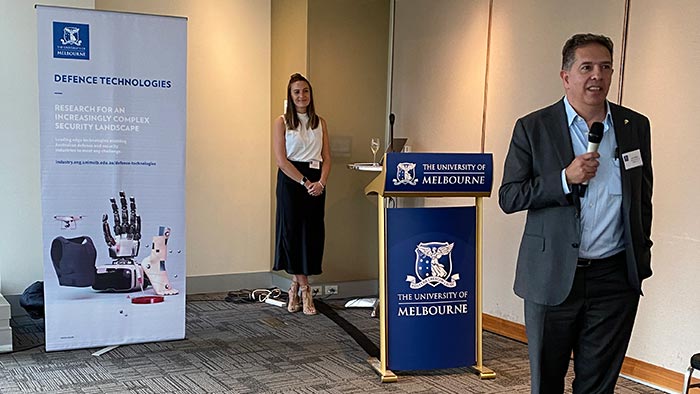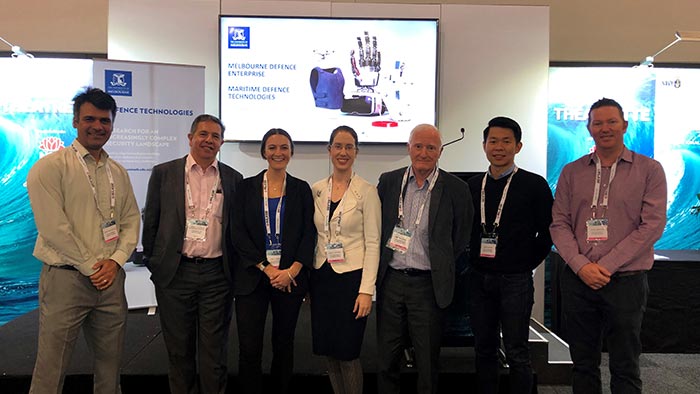Research of scale: Melbourne Defence Enterprise building future capability
By Enterprise Professor Len Sciacca, Melbourne Defence Enterprise
Research into defence technologies is helping to develop the future workforce in defence while enhancing national security.
The University of Melbourne’s defence research portfolio is now one of the largest in the country and includes expertise from academic departments spanning engineering and IT, medicine, science, social sciences, law and arts.

As the Enterprise Professor for Melbourne Defence Enterprise, I lead a cross-disciplinary enterprise team which includes:
- Emily Ebbott, who maintains over a dozen key industry and government partners and leads a portfolio of programs in social sciences, intelligence analytics, artificial intelligence and information and influence.
- Dr Nicholas FitzGerald, enterprise fellow and lead on the portfolios of human performance, medical countermeasures, biomedical sensors. Dr FitzGerald is also engaged with a number of agencies and companies developing novel biomedtech technologies.
I provide strategic planning and facilitate activities across a broad research portfolio, including autonomous systems, cybersecurity, quantum sensors, maritime and medical countermeasures.
My role is to facilitate connections between the University’s researchers with industry, government and other research institutions to address the challenges facing defence and national security in Australia and globally.
We manage industry relationships and bring together the expertise needed for specific projects from within the University and through national and international partnerships.
We help the academics shape their research projects – facilitating workshops and listening to industry needs – to ensure the research delivers the required outcome. We prepare proposals and business cases, working with industry to identify impactful solutions to their business challenges. Importantly, we also look for opportunities to apply our teaching to allow our students to gain industry exposure early on.
Innovation experience
I began my career as an electrical engineering in control systems and signal processing, and over several decades I have worked in every part of the innovation system, from small business start-ups to major international projects. I’ve worked with CSIRO, the University of Newcastle, Defence Science and Technology (DST) and with a large engineering firm as their Engineering Manager.
We help the academics shape their research projects – facilitating workshops and listening to industry needs – to ensure the research delivers the required outcome
I started my own satellite tracking technology company with academic colleagues from Newcastle, developing control systems for large earth station dishes. While at DST I was Chief of Electronic Warfare and Radar Division, leading large research teams and international collaborations, and then as Chief of Science Partnerships and Engagement I developed the partnership framework for universities and managed international collaborations.
This experience has given me valuable insight into the innovation process and the imperatives of organisations operating at different levels. This includes understanding how to derive the most benefit from research and apply it in real systems. It has greatly influenced how I lead the Melbourne Defence Enterprise.
Investment and collaboration
The University’s defence enterprise’s approach leverages a number of programs arising from the $1.3 billion the Department of Defence is investing to build relevant research capacity and innovation in Australia. More recently, DST has announced it will focus its research into 'STaRShots' – creating large-scale research programs and unique capability in the country.

Defence researchers from the University
Autonomous systems have been identified as a priority area for the Defence Cooperative Research Centre (CRC) in Trusted Autonomous Systems. The University of Melbourne is a major partner in the CRC with three projects, and also has other established research projects with more than 10 industry partners in a variety of technology areas.
We aim to build research of scale, with large programs in advanced antennas, human performance, quantum sensors, advanced materials, information operations, cybersecurity, medical countermeasures, and the maritime and aerospace fields.
Leadership and vision
We are actively working to develop the next generation of what I call the “entrepreneurial academic”. These are academics who excel in their research area and also look beyond their specific field of expertise to ascertain where their research can be applied. They can articulate their vision for the purpose of their work, helping to inspire potential funding partners and collaborators, and drive interest from the government and the community more broadly. They contribute to public debate and help shape the direction of national research priorities and outcomes.
This new breed of entrepreneurial academics draw people together to form complex teams and, in a planned and methodical way, progress towards their vision bringing the team members with them.
The Melbourne Defence Enterprise team is motivated by helping our academics to develop this entrepreneurial outlook, growing the scale and impact of their research and helping forge the long-term partnerships needed to bring research vision to fruition.